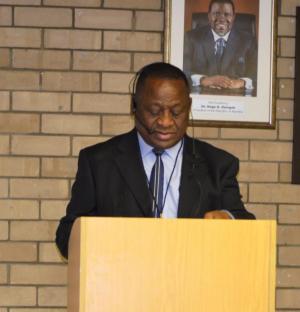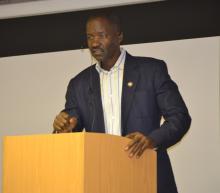New Minister of Health recommits government to end Hepatitis E Outbreak
The Ministry of Health and Social Services has recommitted itself to ending the Hepatitis E Outbreak which has claimed 41 lives since December 2017. A National Health Emergency Management Committee was activated since confirmation of the outbreak and the Ministry has engaged partners and mobilized resources to respond to the outbreak. Despite these control measures, the disease persists and has now spread to more than 7 of the 14 regions of the country.
The Minister of Health and Social Services, Honorable Dr Kalumbi Shangula said that there is a possibility for Namibia to become an endemic country for Hepatitis E – "a sad and an unwelcome development".
“What I find distressing is the fact that there is an air of indifference toward the outbreak among the public. The commitment of some of the important stakeholders seems to be declining. The urgency to take drastic measures to contain the disease seems to be waning.”
He said that what needs be to administered is what he referred to as “shock therapy”. The Honorable Minister was speaking at a special consultative meeting held on 7 February 2019 with stakeholders to review response strategies and interventions; identify gaps and shortcomings and recommit to the eradication of Hepatitis E in Namibia.
The Minister announced the appointment of the former Minister of Health and Social Services Dr Bernard Haufiku, who now serves as the Special Advisor on Health in the Office of the Vice President to coordinate the HEP E outbreak response. In his acceptance speech Dr Haufiku said that “We (will) go out there, take off our ties, wear short sleeves (shirts) and go into the community. This is my perception and how I am going to approach” He also made reference to a rapid assessment report on the outbreak response by WHO which highlighted:
- The need to strengthen coordination and engagement of leaders at regional and local authority levels
- The need to strengthen the timely reporting on the outbreak response including new cases from all affected regions
- The need to strengthen communication and social mobilization efforts to ensure sustained behavior change in affected communities
- The need to address inadequate access to water and sanitation, and unhygienic practices
Speaking at the same occasion was the Representative of the World Health Organization, Dr Charles Sagoe-Moses who reiterated the need to redouble efforts and strengthen community engagement in the response. He said that WHO has been supporting the Ministry and will continue to do so, in all efforts to build human resource capacities for outbreak coordination, surveillance, social mobilization, community engagement and case management. In addition to the technical support that WHO has been providing, the Organization committed 195,000 USD to strengthen the Ministry’s response in all affected regions.
Over 4000 cases of HEP E have been reported since Dec 2017 and the Khomas region continues to carry the burden of the disease with over 3,000 cases.







